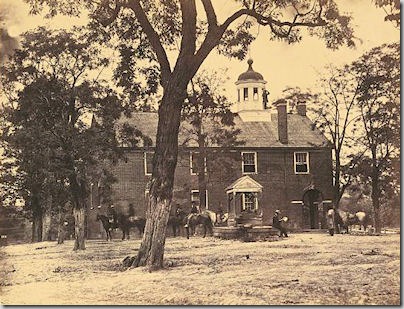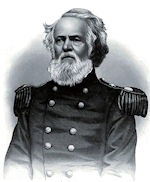 —The advance column of the National army occupied Fairfax Court House, Va., at eleven o’clock to-day, meeting with no opposition from the Confederates either on the march or in taking possession of the place. Trees had been felled across the road and preparations made at one point for a battery, but there were no guns or troops on the route. The Confederates were drawn up beyond the town and a battle was expected, but as the National forces pressed on they retreated. The cavalry followed them some miles toward Centreville, but the heat of the weather and the previous long march prevented the infantry following. The abandonment of the village by the Confederates was so sudden that they left behind them some portions of their provisions, intrenching tools, and camp furniture. The army advances in three columns, one on the Fairfax road, and the others to the north and south of the road. The advance will be continued to Centreville, eight miles beyond Fairfax, where the Confederates will probably make a stand if they design attempting to hold Manassas Junction. The only casualties reported by Gen McDowell are an officer and three men slightly wounded.—(Doc. 98.)
—The advance column of the National army occupied Fairfax Court House, Va., at eleven o’clock to-day, meeting with no opposition from the Confederates either on the march or in taking possession of the place. Trees had been felled across the road and preparations made at one point for a battery, but there were no guns or troops on the route. The Confederates were drawn up beyond the town and a battle was expected, but as the National forces pressed on they retreated. The cavalry followed them some miles toward Centreville, but the heat of the weather and the previous long march prevented the infantry following. The abandonment of the village by the Confederates was so sudden that they left behind them some portions of their provisions, intrenching tools, and camp furniture. The army advances in three columns, one on the Fairfax road, and the others to the north and south of the road. The advance will be continued to Centreville, eight miles beyond Fairfax, where the Confederates will probably make a stand if they design attempting to hold Manassas Junction. The only casualties reported by Gen McDowell are an officer and three men slightly wounded.—(Doc. 98.)
—The Sixth Regiment of Maine volunteers, commanded by Colonel Abner Knowles, left Portland for the seat of war. The regiment, which has been recruited mainly from the counties of Washington and Penobscot, consists mostly of stout, hardy lumbermen, already inured to hard work and apparently ready for more. Many of the privates measure six feet four. They are uniformed in a similar manner to the other Maine regiments. Each man has an extra fatigue uniform, consisting of gray pants and shirt, presented to them by various sewing societies. Surgeon-General Garcelon, of Maine, accompanies the regiment to Washington.—Boston Post, July 18.
—The following order relative to contraband negroes was issued from the army head-quarters in Washington:
Head-quarters Department of Washington,
Washington, D. C., July 17, 1861

General Orders No. 33.
Fugitive slaves will, under no pretest whatever, be permitted to reside, or in any way be harbored in the quarters and camps of the troops serving in this department. Neither will such slaves be allowed to accompany troops on the march. Commanders of troops will be held responsible for a strict observance of the order.
By command of Brigadier-General Mansfield.
Theodore Talbot,
Assistant Adjutant-General.
—General Patterson’s entire command moved from Bunker Hill, Va., at an early hour this morning, but instead of moving directly towards Winchester it took the road for Charlestown, distant from Bunker Hill about eight miles, and laying at right angles with the Winchester road. The reason of this unexpected move is as follows: Winchester is defended on the north side by a strong breastwork, in the form of the letter V, having the town behind the angle. It cannot be attacked from that side without exposing the soldiers to a heavy and most destructive cross-fire. The side west of the town is defended by a palisade; but the east aide is only covered by a veil. On the east side there is also an eminence which commands the town. This eminence has been left unoccupied.—Baltimore American, July 18.
—The Twelfth Ohio Regiment, two companies of the Twenty-first Ohio and a battery of light artillery, attacked the rebels at a place called Scarytown, on the Kanawha River, Va., and were repulsed with a loss of thirty killed and wounded.—(Doc. 99.)


